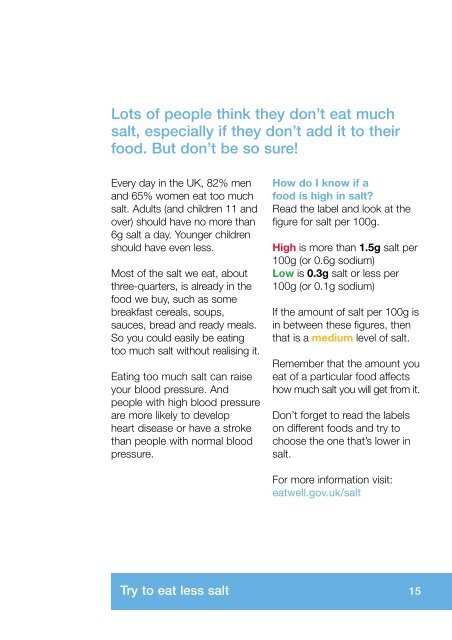eatwell0708
eatwell0708
eatwell0708
Create successful ePaper yourself
Turn your PDF publications into a flip-book with our unique Google optimized e-Paper software.
Lots of people think they don’t eat much<br />
salt, especially if they don’t add it to their<br />
food. But don’t be so sure!<br />
Every day in the UK, 82% men<br />
and 65% women eat too much<br />
salt. Adults (and children 11 and<br />
over) should have no more than<br />
6g salt a day. Younger children<br />
should have even less.<br />
Most of the salt we eat, about<br />
three-quarters, is already in the<br />
food we buy, such as some<br />
breakfast cereals, soups,<br />
sauces, bread and ready meals.<br />
So you could easily be eating<br />
too much salt without realising it.<br />
Eating too much salt can raise<br />
your blood pressure. And<br />
people with high blood pressure<br />
are more likely to develop<br />
heart disease or have a stroke<br />
than people with normal blood<br />
pressure.<br />
How do I know if a<br />
food is high in salt<br />
Read the label and look at the<br />
figure for salt per 100g.<br />
High is more than 1.5g salt per<br />
100g (or 0.6g sodium)<br />
Low is 0.3g salt or less per<br />
100g (or 0.1g sodium)<br />
If the amount of salt per 100g is<br />
in between these figures, then<br />
that is a medium level of salt.<br />
Remember that the amount you<br />
eat of a particular food affects<br />
how much salt you will get from it.<br />
Don’t forget to read the labels<br />
on different foods and try to<br />
choose the one that’s lower in<br />
salt.<br />
For more information visit:<br />
eatwell.gov.uk/salt<br />
Try to eat less salt 15


